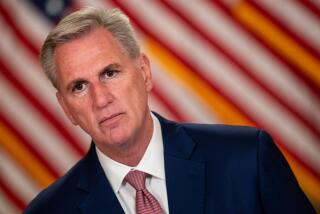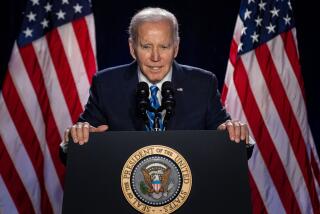Obama hits the stimulus campaign trail
WASHINGTON AND ELKHART, IND. — In a sharp rebuke to Republicans who have sought to whittle down and redirect his stimulus plan, President Obama declared Monday that quick and massive government action is vital to repair “a gaping hole in our economy” that could lead to a long-term catastrophe.
“We’ve had a good debate. Now it’s time to act,” Obama said Monday night in his first full-scale news conference since entering the White House. Americans “need help right now,” he said, “and they can’t afford to keep on waiting for folks in Washington to get this done.”
While reiterating his willingness to discuss compromises and changes in his stimulus plan, he bluntly rejected traditional Republican economic strategies.
“What I won’t do is return to the failed theories of the last eight years that got us into this fix in the first place, because those theories have been tested and they have failed.”
The new, more aggressive language represented a marked shift in White House tactics only three weeks into Obama’s presidency.
Tacitly acknowledging that he had little to show for hosting bipartisan talks, appealing for bipartisan compromise and even hosting a bipartisan White House cocktail party for members of Congress, Obama returned to tactics that worked for him in last year’s campaign.
He appealed directly to the public for support against what he portrayed as partisan paralysis in Washington.
Earlier in the day at a town hall-style meeting with voters in recession-ravaged Elkhart, Ind., which recently lost hundreds of jobs in a local factory, Obama used tough language in condemning “posturing and bickering” in Congress.
“You didn’t send us to Washington because you were hoping for more of the same,” Obama said. “You sent us there with a mandate for change and the expectation that we would act quickly and boldly to carry it out.”
Even as he went on the attack, however, Obama returned to the modulated tones that have been a hallmark of his style.
Discussing the need to get beyond partisan polarization in the capital, Obama sounded less like a political gladiator fighting for his first big initiative than a schoolteacher trying to calm overwrought children.
“Whether we’re Democrats or Republicans, surely there’s got to be some capacity for us to work together -- not agree on everything, but at least set aside small differences to get things done,” he said at the news conference.
Still, he drew a line on the stimulus plan.
“My bottom line when it comes to the recovery package is, ‘Send me a bill that creates or saves 4 million jobs,’ because everybody has to be possessed with a sense of urgency about putting people back to work, making sure that folks are staying in their homes, that they can send their kids to college.”
The appeal for popular support came at a crucial moment, on the eve of an expected Senate vote on the stimulus plan and days before Senate Democrats’ self-imposed Presidents Day deadline for final passage of a plan.
As lawmakers enter a week of negotiations, the president was planning to travel to Fort Myers, Fla., and Peoria, Ill., to keep up the pressure from outside Washington.
In the interest of keeping the focus on the stimulus plan, administration officials had considered delaying a speech by Treasury Secretary Timothy F. Geithner, who will unveil the next phase of the Obama economic plan with a blueprint for spending the rest of the financial bailout money approved by Congress last fall.
Obama said that address would take place today but hinted that it would not go beyond the question of how to spend the $350 billion remaining in the original financial bailout.
“We don’t know yet whether we’re going to need additional money or how much additional money we’ll need until we’ve seen how successful we are at restoring a sense of confidence,” he said.
Seeking more money to stabilize major financial institutions is politically explosive. Both Congress and much of the public are adamantly opposed to spending billions more tax dollars to bail out financiers whose risky lending and investment practices are seen as the precipitating cause of the crisis.
Yet the continuing possibility that major banks could fail, setting off another financial tsunami, could force the administration to propose just such a course of action.
And there’s even more at stake than the president’s economic plans. In the Republican response to his stimulus plan, Obama saw signs of future GOP determination to water down key parts of his long-term agenda.
That’s one reason the president decided to move outside of the capital, aides said, and specifically to go to states that voted for him in the fall election despite their Republican leanings.
In Florida, he’ll be joined by Republican Gov. Charlie Crist, a supporter of the stimulus plan. Crist has agreed to introduce Obama, according to the White House.
Behind the trips is a White House calculation that the messy argument over components of the stimulus plan has become a diversion. By leaving Washington and talking to Americans who are enduring the brunt of the economic downturn, Obama hopes to redirect attention to the need for the stimulus in the first place.
Speaking to reporters aboard Air Force One, en route to Indiana, Press Secretary Robert Gibbs drove home the point that Obama is trying to school Congress on the issue.
“This is not explaining to Indiana what’s going on in Washington,” he said. “This is taking Washington to show them what’s going on in Indiana and all over the country, and why people are hurting.”
Polling data suggests Obama does have some political wind at his back, at least in terms of the stimulus plan. A Gallup poll suggests that 67% of Americans approve of his effort to pass the stimulus package.
Meanwhile, the poll finds less support for Congress, with Democrats earning a 48% approval rating and Republicans getting 31%.
Against that backdrop, Obama held his first evening news conference at a podium set up at the entrance to the East Room, with the red and gold carpet of the White House’s stately center hall flowing behind him.
After an opening statement, the president responded to about a dozen questions during his hourlong news conference. At every opportunity, he returned to the idea that the downturn is “not your ordinary, run-of-the-mill recession.”
In Elkhart, that message seemed to find a receptive audience. Obama’s first presidential trip to meet with citizens had the flavor of a campaign event. The crowd roared when he arrived on stage, shouting and chanting his name.
Cesar Pincheira, 73, a retired engineer from Elkhart, said the spending proposed in the stimulus plan is “not 100% good, but it’s better than doing nothing.”
“We have to do something,” he continued. “I have too many friends out of work.”
Barry Fox, 53, said he had “mixed emotions” about the stimulus. He worries about the “pork” in the bill. Like Pincheira, however, Fox said the country must act.
“There’s stuff in [it] that I do not like,” said Fox, a longtime Republican who voted for Obama in November. “But at the same time, I don’t think that we can afford to not do anything.”
--
--
A strategy for public support
Obama aims to define the GOP as beyond the mainstream. NATION, A12
--
Senators clear path for stimulus
The $827-billion plan wins a slim majority in a procedural vote. NATION, A12
More to Read
Sign up for Essential California
The most important California stories and recommendations in your inbox every morning.
You may occasionally receive promotional content from the Los Angeles Times.











